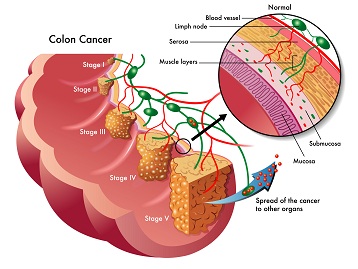Scientists report an important breakthrough in colon cancer treatment

Related topics
Health Innovation Health, Demographic Change and Wellbeing Belgium Italy Netherlands Spain United Kingdom Switzerlanddate: 28/03/2014
Project: Modelling and predicting sensitivity to ...
acronym: COLTHERES
See also: CORDIS
Contact: http://www.coltheres.org/
Prof. Alberto Bardelli of the University of Torino Medical School and Institute for Cancer Research says: “Most cases of colon cancer are not diagnosed until they have become metastatic, that is when the disease has already spread to other organs, such as the liver. At this stage, surgery becomes very problematic and chemo- or radiation therapies are the best remaining options.”
Bardelli is coordinator of the EU-funded COLTHERES project, which aims at developing new molecular tests that could help guide more effective therapies for certain types of colon cancer.
Unfortunately, Bardelli says, some particular subtypes of colon cancer respond very poorly to treatment, including chemotherapy, leaving patients suffering from this form of the disease with no real treatment options and a very dismal prognosis.
COLTHERES has been focusing on one of these subtypes, which seems to be caused by a particular genetic mutation, referred to as the ‘BRAF’ mutation. Bardelli says the presence of this mutation, which patients can now be tested for, can help doctors predict how those patients may or may not respond to therapy.
Members of the COLTHERES consortium led by Dr. René Bernards announced their discovery in the prestigious scientific journal Nature in 2012, based on studies they carried out in cell lines and laboratory mice. Bardelli says these promising results are now being evaluated for treatment of human patients in clinical trials.
“Once we understood the molecular characteristics of BRAF-mutated colorectal cancers, we were able to rapidly devise a unique treatment ‘cocktail’, combining different constituents tailored to the individual patient. This drug combination is presently being tested in clinical trials,” he says.
Bardelli credits a top-notch team, combining clinicians, laboratory scientists, computer modellers and small businesses, for the project’s success: “Our group includes some of the best cancer specialists in Europe and indeed the world, and our small industrial partners are helping us to bring our results to the marketplace as quickly as possible, to help the largest number of patients and to maximise the economic exploitation of our work.”
He cautions that the new treatment strategy developed by COLTHERES remains to be validated in the clinic and is only useful in combating a certain subtype of colon cancer.
“Nevertheless,” he says, “our work does give new hope to patients suffering from this specific form of the disease and for whom treatment options were, until now, virtually non-existent.”
COLTHERES, which runs through 2014, is aimed at tackling the EU’s 2020 challenge of improving health for all EU citizens.
